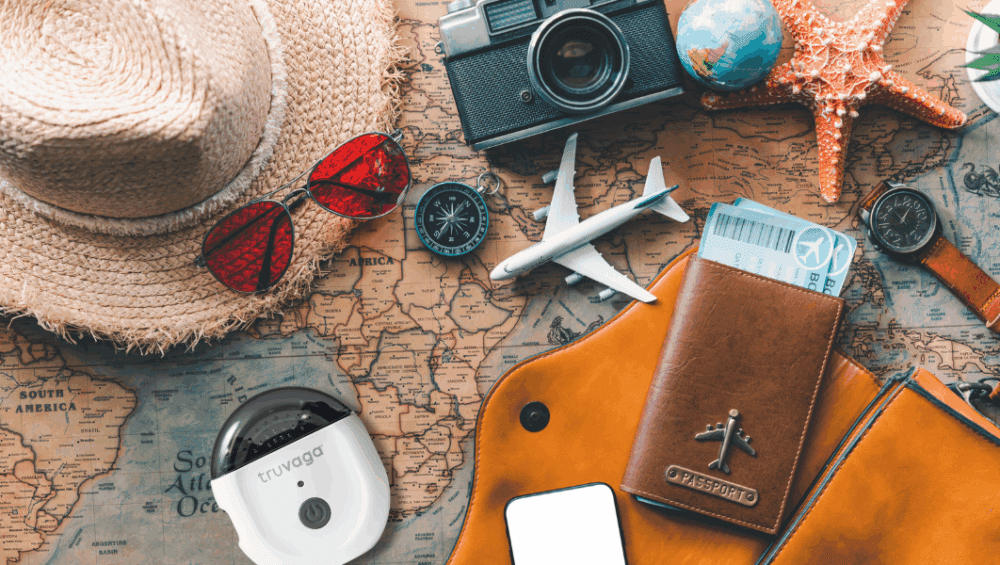Travel is meant to restore you, but it can often do the opposite.
Flight delays, lost luggage, and packed itineraries can quickly overload your nervous system, leaving you feeling anxious, wired, and exhausted before you even arrive.
The truth is, even the most exciting trips can trigger stress responses in the body. But with the right tools, you can help your system stay regulated and resilient, no matter where you’re headed.
Before we dive into our top 5 tips for staying calm while traveling, let’s explore how your nervous system responds to stress and how to gently guide it back into balance.
Understanding Your Nervous System on the Go
Your nervous system is your body’s command center, regulating everything from movement and memory to breathing and digestion. But when you travel, your autonomic nervous system takes center stage.
This system controls automatic functions like heart rate, digestion, and your body’s response to stress. It’s made up of two key parts: the sympathetic nervous system (your “fight-or-flight” response) and the parasympathetic nervous system (your “rest-and-digest” state).
When these two systems are in balance, your body can adapt to change and recover from stress. But travel can disrupt that balance. That’s why understanding nervous system regulation is key to staying calm, grounded, and resilient while you’re on the move.
Let’s explore five simple, science-backed ways to support your nervous system and stay centered wherever your travels take you.
Tip 1: Try Intentional Breathwork
Stress triggers shallow, rapid breathing, but you can override that. Diaphragmatic breathing, otherwise known as deep belly breathing, stimulates the vagus nerve and encourages parasympathetic (rest-and-digest) activity.(1)
Research shows that even one session of slow deep breathing can increase vagal tone and reduce anxiety.(2) Another recent trial confirmed that guided breathing reduces stress and anxiety in just a few minutes.(3)
How to practice:
- Inhale slowly through your nose, letting your belly rise
- Exhale gently through your mouth
- Repeat for a few minutes whenever you feel tension rise
Tip 2: Move, Even a Little
You don’t need a gym to get your blood flowing. Simple movements can work wonders for your mood, circulation, and nervous system.
Try:
- A short walk around the airport terminal or rest stop
- Gentle neck rolls or seated stretches
- A few rounds of Cat-Cow or shoulder rolls with deep breathing
Even minimal movement supports vagus nerve activation and helps shake off travel tension.
Tip 3: Eat and Drink to Support Your System
Your nervous system is highly sensitive to what you consume. Unfortunately, travel often means grabbing whatever’s quick, and that usually means salty, sugary, or fried.
Support your system by packing or choosing:
- Bananas, trail mix, or dark chocolate for mood support
- Low-sodium nuts and popcorn for sustained energy
- Water over soda or alcohol to stay hydrated
Avoid overdoing caffeine or skipping meals, both can heighten anxiety and deplete your system’s resilience.
Tip 4: Create Your Calm Zone
Travel environments can be overstimulating. To help your body relax, create a mini sanctuary with a few thoughtful tools:
- Noise-canceling headphones and calming playlists
- An eye mask or light-blocking sunglasses
- Cozy layers, socks, or a soft travel pillow
Bonus tip: pack for the “what-ifs.” Extra chargers, medication, or snacks can reduce uncertainty and help you feel more in control.
Tip 5: Use Vagus Nerve Stimulation Technology
Beyond manual techniques, non-invasive vagus nerve stimulation (VNS) offers quick, reliable reset support.
Truvaga’s portable devices provide gentle stimulation in just two minutes, and are scientifically shown to help calm nerves, improve focus, and support better sleep. While VNS has FDA clearance for conditions like epilepsy and depression(4), emerging research also highlights its potential for everyday stress reduction.(5)
Final Thoughts
Travel can be energizing, but it can also strain your nervous system. With the right tools and a little preparation, you can stay calm, grounded, and adaptable throughout the journey.
Whether you’re on the move or finally unwinding, Truvaga helps keep your nervous system in balance, naturally.
Ready to feel more calm on the go?
Author bio:
Truvaga Team
Calm Creators. Wellness Advocates. Everyday Guides.
A dedicated group with expertise in neuroscience, wellness, and innovation. We are passionate about helping you feel your best, sharing simple, practical tips and habits that support better sleep, a calmer mind, improved digestion, and greater focus. We’re here to help you understand the power of the vagus nerve and how small, consistent practices can make a big difference in your daily life. Connect with us on Instagram @truvaga for daily tips, inspiration, and wellness insights.References:
- Grossman, Paul, et al. The Influence of Breathing on the Central Nervous System. Frontiers in Psychology, 2019.
- Brown, Roberto M., et al. Benefits from One Session of Deep and Slow Breathing on Vagal Tone and Anxiety in Older Adults. Scientific Reports, 2021.
- Laborde, Sylvain, et al. Effects of Slow-Paced Breathing on Heart Rate Variability and Subjective Stress in Daily Life. Scientific Reports, 2021.
- Daban, Christophe, et al. Vagus Nerve Stimulation for Treatment-Resistant Depression: Acute and Follow-Up Results of an Italian Case Series. Journal of ECT, 1999.
- Vonck, Robrecht, et al. Vagus Nerve Stimulation…25 Years Later! Neuroscience & Biobehavioral Reviews, 2023.
 US
US
 UK
UK






